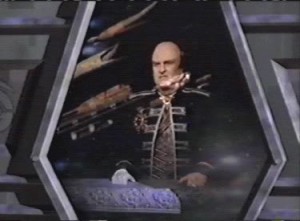In the first part, I focused on how and why I read such monstrous books. Now I want to touch briefly about their effect on my writing.
I think my early attempts at novels, especially Trouble on the Horizon, were unconsciously guided by the large plots, numerous characters, and wide world of The Wheel of Time, which deeply affected me in middle and high school.
Throw in the discovery of Babylon 5, a five-season TV space opera with a definite beginning, middle, and end (which was basically unheard of back in the 90s), and you have a young artist soaked in stories that span years and cultures and multiple intertwined themes.
Fast forward 15 years or so, and now you find a somewhat older artist not quite sure he can pull off such an epic and not completely convinced he wants to.
I was a little sad after I finished The Way of Kings because I didn’t know if I had it in me to create such a BIG BOOK. I tried to figure out what had changed. I think, in some ways, it’s not so much that I’ve changed but I’ve discovered the kind of writer I am. Let me break it down:
- Time – Okay, this is something that has changed. My time is limited and writing half-a-million word books is a bit daunting.
- Too Many Ideas – Though connected to the time issue above, this is also a choice. I don’t want to spend a decade on one story, at least not now. Honestly, as anyone who’s followed the long, slow progress of Strin & Fred knows, I tend to move from idea to idea faster than I should.
- World-building – I’ve discovered I’m not a world builder, not in the extensive sense required by long fantasy epics. The Unremarkable Squire has a thumbnail history and a map, but I don’t have a world bible explaining the culture or even a good sense of what differentiates the 40 nations of the Isle. The two big worlds I worked on in high school were created with partners who had a good eye for such things; I tended to be the guy who helped form the worlds into drama.
- Focus on the Personal – This is something I’ve discovered by looking over my past work. I don’t write characters who are in the middle of world-changing events. I write characters who are on the fringe. I mean, The Unremarkable Squire is largely a story of a young man who tries not to be in the middle of the action, and the “big” story is actually somewhat tangential, or at best parallel, to Obed’s, though they obviously intersect at the end.
Then in Children of the Wells there’s a earth-shaking cataclysm and what do I do? Focus with laser intensity on two survivors in a way that does almost nothing to address the central issue of why the cataclysm happened or how it affects the power structures of the world. Is it good drama? I think so. But it also avoids the large-scale picture. The same tends to happen in Strin & Fred. Despite the big events happening, the main thrust of the stories deal with more personal character issues. I gravitate toward individual stories against a big backdrop.
Not, epic plots do this as well, but they also center on the vital players in the drama, with the knowledge that they are vital, and that tends to be secondary to my normal way of thinking. I don’t necessarily care if my characters are movers and shakers, and sometimes I think I like them not to be. - One Size Does Not Fit All – A few years ago, when I dedicated myself to writing flash fiction, I discovered in a new way how well different sizes of stories fit different ideas. In my mind, I tend to have several categories–the flash fiction (<1k words), the short story (2-5k), the long short story (~10k), the novella (20-30k), the novel (60-100k+), and the series. Most times, I can tell you before I start how much room an idea needs. And I like them all for different reasons.
Now, I do have some “epic” stories in my mind, things like Twilight Dawn and 100 Letters, but if I ever tackle them, I think they’ll end up in a style quite different than the epic fantasies I fell in love with, just as Strin & Fred is not quite your average fantasy series. They’re likely to be more literary or more episodic or more, well, I don’t know yet.
And I guess I’m okay with that. In any case, it’s the only way I know how to write.
